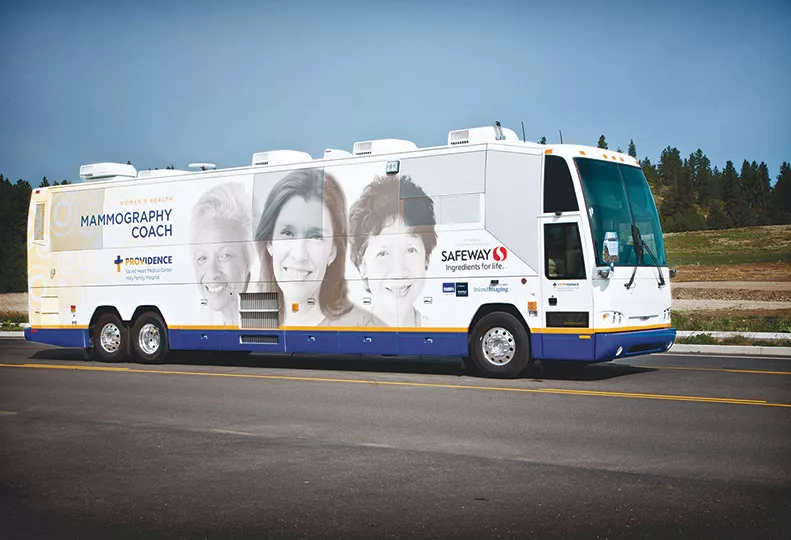Mammography bus expands capabilities, reach
Five-year-old vehicle here adds portable defibrillator

Providence Health Care’s five-year-old mammography coach, which has seen recent growth in the number of mammograms it performs and is extending its reach into additional rural areas, soon also will be equipped with a portable defibrillator, giving it the ability to respond to incidents of sudden cardiac arrest.
Lisa Mertens, an assistant nurse manager in women’s outpatient services at Providence Sacred Heart Medical Center & Children’s Hospital who oversees the mammography bus, says that department acquired one of the devices—more formally called an automated external defibrillator, or AED—last month through a grant from the Providence Health Care Foundation.
It expects to have the device on the mammography coach and ready for emergency use within a few weeks, as soon as policies for its use have been firmed up and the coach staff, which includes two radiology technicians and two drivers, has been trained in its use, Mertens says.
“They all have training in CPR, but the AED has become the device of choice for cardiac (arrest incidents),” she says.
Portable defibrillators, about the size of a small laptop computer and equipped with adhesive pads that attach to the patient, apply an electronic shock to restore the rhythm of a fibrillating heart, which is undergoing rapid contractions of muscles. Such heart fibrillation can be fatal.
Mertens, who began overseeing coach operations in January, says she quickly applied for the grant after discovering that the 45-foot-long mammography coach, which regularly visits small communities throughout the Inland Northwest in an effort to reach out to underserved women, didn’t already have that emergency capability.
“I was taken aback as to why we didn’t have anything more than a little first-aid kit aboard,” she says.
The defibrillator will enhance the capabilities of what already is a popular mobile provider of focused women’s health care screening services. The mammography coach accounted for 2,060 mammograms in 2013, and this year already has been used about 120 more than last year, Mertens says. It currently operates five days a week, but Mertens says Providence is considering adding Saturday service, when communities typically have health care-focused public events.
Along with mammograms, the coach also has equipment onboard for doing osteoporosis screening for those women who would like it, she says.
The coach, which covered 37,000 miles last year, serves an Inland Northwest area that stretches roughly from Lewiston and Kellogg, Idaho, to the south and east, and to Okanogan County in north central Washington, Mertens says.
“We’re just getting into the Brewster area,” northeast of Chelan, she says, adding, “We’re looking for more areas we can go into.”
At communities that the coach visits annually, she says, “I’m working really hard to see those women we’ve seen in previous years,” so they can have follow-up mammograms. Women who have mammograms performed in the coach fill out forms on which they indicate how they’d like to be contacted in the future, and Mertens says, “That’s been a project of mine this spring organizing all of that.”
She says, “It’s been going great. We’ve been seeing a real strong callback rate. We’re excited about the growth, and we hope to continue that.”
Although she’s been overseeing coach operations for a relatively short time, Mertens says she’s a believer in the importance of the service it provides.
“I’ve had a chance to speak with some of the women (who’ve had mammograms performed on the coach),” she says. “We’re hearing every day how we’re saving lives.”
The coach travels to facilities and businesses to provide recommended annual screening mammograms, which can help detect breast cancer early for the best chance at successful treatment.
Inland Imaging LLC, of Spokane, reads the mammograms, looking for anything suspicious, and reports results to the women’s doctors. Diagnostic mammograms are performed later on patients who have signs or symptoms of a problem.
Joyce M. Cameron, chief development officer for the Spokane-based Providence Health Care Foundation, formed a few years ago through a merger of Sacred Heart and Holy Family hospital foundations, says a foundation-administered grant has paid for the placement of well over 100 AEDs throughout the Inland Northwest since 2010.
The original grant was for a little over $100,000, but Cameron says, “We have subsequently added to that. We started its own fund. We’ve gotten money from sudden death survivors who were saved because of the AEDs.” Other generous supporters of the program, she says, have included the Safeway Foundation, the Susan G. Komen Breast Cancer Foundation, Inland Imaging, and the Tomlinson Real Estate Group.
The Providence Health Care program is affiliated with Project Adam, a Wisconsin-based nonprofit started in 1999 by the parents and friends of 17-year-old Adam Lemel, who died of sudden cardiac arrest. Project Adam’s mission is to serve young people through education and deployment of life-saving programs that can help prevent such deaths. Affiliates of the nonprofit carry out that work largely through partnerships with school systems.
Ryan Schaefer, a registered nurse who is the electrophysiology coordinator for Sacred Heart and the designated Project Adam coordinator for the state of Washington, says the program “has really taken off in Spokane.”
Schaefer says, “We’ve placed around 110 AEDs in the community, mostly in schools, but we’ve really become a resource within the Inland Northwest for implementing an AED program. Our goal is to form a program around that AED (wherever they’re placed). They’re a great tool, but with that needs to come awareness and training, and an emergency action plan.”
The Sacred Heart Medical Center Foundation raised $1.2 million to buy and equip the current mammography coach five years ago. Equipped with all-digital technology, it replaced one that Sacred Heart had been using for about a decade and that provided film-based mammography imaging.
Related Articles

_c.webp?t=1763626051)
_web.webp?t=1764835652)

